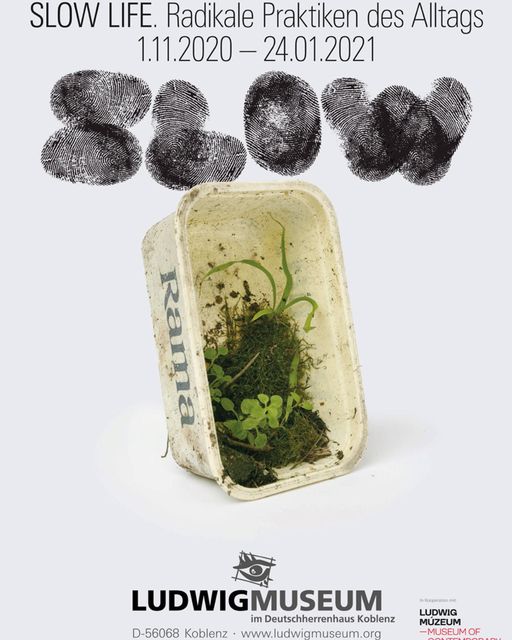SLOW LIFE. Radical Practices of the Everyday
01.11.2020 – 24.01.2021
Ludwig Museum in Koblenz
“SLOW LIFE. Radical Practices of the Everyday” is a group exhibition with an international scope, a commitment that reflects on today’s pressing global issues. The current logic of our world, the existing social & economic system and the market-consumer culture have caused serious environmental problems. The approach they are based upon is in crisis, and current practices cannot provide real solutions to excessive waste production and overconsumption, and to keep the exploitation of natural resources under control.
The beginnings of the Slow Revolution date back to the 1980s, to the protest against fast-food restaurants, which drew attention to the importance of healthy, quality food from local source. Carlo Petrini’s gastronomic initiative has expanded into a global movement over the decades, spanning many areas from work to travel and from design to media consumption. This approach to the slow shaping of life means that existing structures need to be rethought and established practices in the areas of society, business and everyday life need to be reorganized. Consciousness and critical stance are producing more and more new possible alternatives. Ideas from permaculture agriculture to zero waste households, from voluntary simplicity to the concept of a growth-free economy are gathered under this approach.
However, the exhibition does not focus on the ‘slow living’ movements so popular today, some of which limit their activities to offering new products and services for sale. Rather, it presents alternative practices, everyday “revolutions”, gentle or even radical approaches that challenge the existing growth- and profit-oriented system, show a way out of the consumption spiral, or represent an attitude based on the momentum instead of a busy life-style. The broad spectrum of genres on display includes artworks based on critical thinking, while others offer utopic models for future challenges, or encourage us to change our art consumption habits, as well as the clichés of perception and reception in connection with art.
The exhibition aims to show the environmental impacts and exploitation practices that have led to the current global environmental, economic and social problems. At the same time, the exhibition intends to create a broader platform for such artistic positions that emphasize sustainability and offer alternative ways of life.
Due to the global Covid-19 pandemic caused by the corona virus, the topics of the exhibition became imminent and urgent – “Slow life” has suddenly become an everyday reality, a forced way of life in the global world. The “Quarantine of Consumption”, the “Stay Home” movement, the decline in air traffic, the slowing economy are just some of the unexpected consequences of the virus, which ruthlessly point to the positive effects of a slower life, but which also pose enormous challenges for humanity.
Participating Artists: Gabó BARTHA | Emese BENCZÚR | Anca BENERA & Arnold ESTEFÁN || Krisztina ERDEI | Gideon HORVÁTH | Oto HUDEC | Tamás KASZÁS | Endre KORONCZI | LAKNER Antal | Diana LELONEK | Péter MÁTYÁSI | Oliver RESSLER | Judit Flóra SCHULLER | Rita SÜVEGES | Eszter Ágnes SZABÓ & Syporca WHANDAL | Lois WEINBERGER | Anna ZILAHI
The exhibition Slow Life – Radical Practices of the Everyday was conceived by the curatorial team of the Ludwig Museum Budapest. The current situation also had an impact on the preparation and realization of the exhibition, that it could initially only take place digitally in Budapest. The exhibition now premieres at the Ludwig Museum in Koblenz and will be shown in Budapest in 2021. In a special way, aspects of sustainability, the distribution of resources and “slow life” also come together in this partnership between the two befriended Ludwig Museums.
Curators: Petra Csizek, Jan Elantkowski, József Készman, Zsuzska Petró, Viktória Popovics, Krisztina Üveges Exhibition
source: https://ludwigmuseum.org/en/ausstellungen/slow-life-radical-practices-of-the-everyday-2/


